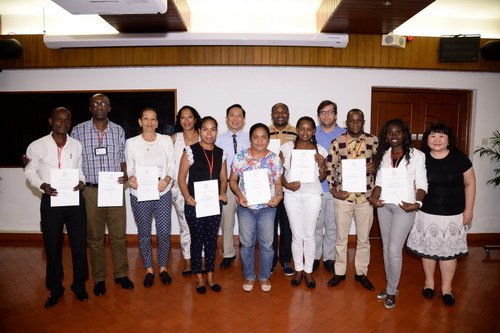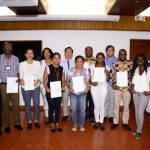 Participants took a group photo with the trainer.
Participants took a group photo with the trainer.
The Institute for Tourism Studies (IFT) hosted on 2 June a 1-day workshop on tourism planning and development that was aimed at representatives of tourism-related government bodies from Portuguese-speaking countries. It was the first time IFT hosted a training workshop tailor-made for representatives from Portuguese-speaking countries. The workshop was part of the ongoing work by IFT to support the Macao SAR Government’s efforts to promote the city as a cooperation service platform between The People’s Republic of China and Portuguese-speaking countries. The programme was headed by IFT Visiting Professor Dr. John Ap. Before becoming an academic, he was a town planner specialising in recreation and tourism planning. He has also served as a consultant for several organisations, including the International Association of Amusement Parks and Attractions (IAAPA) and the United Nations Organization for Education, Science and Culture (UNESCO). The workshop was divided into 2 sessions. In the morning part, participants discussed the guiding principles of tourism planning; different approaches to tourism development; and related operational and technical requirements. During the afternoon, the group and Dr. Ap conducted a study tour to several tourism attractions in Macao to discuss the respective tourism planning strategies relevant to those attractions. “This was a very valuable workshop and will help us improve our tourism planning,” stated participant Mr. Amostra Alfandiga, a representative from the Ministry of Culture and Tourism of Mozambique. The 10-strong group was in Macao at the invitation of the Macao Government Tourism Office (MGTO) for a 2-week training opportunity. Earlier on October 12, 2015, Macao SAR Government and United Nations World Tourism Organization (UNWTO) signed a Memorandum of Understanding in Macao. The objective was to enhance cooperation between the two parties in improving the quality of human capital and increasing the competitiveness of tourism destinations (particularly in the Asia Pacific Region) in order to achieve sustainable tourism development. The Global Centre for Tourism Education and Training, soon to be set up by the Institute for Tourism Studies (IFT), Macao is tasked with the responsibility to organise training and education programmes, and other projects in collaboration with UNWTO, to achieve the objectives set out in the Memorandum. In the future, the Centre will additionally provide training courses targeted to representatives of Portuguese-speaking countries, with the aim of enhancing exchanges and mutual learning between Macao and Portuguese-speaking countries in the field of tourism. Established in 1995, the Institute for Tourism Studies, Macao (IFT) offers the most extensive selection of tourism and hospitality related bachelor degree programmes in Macao, and about twenty thousand participants attend its vocational and professional training courses annually. IFT collaborates with 97 universities and tourism organisations around the world, and builds strong links with 500 leading tourism and hospitality corporations to offer internship opportunities to its students. Being the first institution accredited by the UNWTO.TedQual Certification System for tourism education, IFT has now 7 bachelor degree programmes with the Certification. Currently, the Institute has the most number of bachelor degree programmes certified under the System of any tertiary education establishment worldwide. IFT has received the Medal of Merit in Tourism from the Macao SAR Government, and won twice the Gold Award in ‘Education and Training’ from the Pacific Asia Travel Association (PATA).


